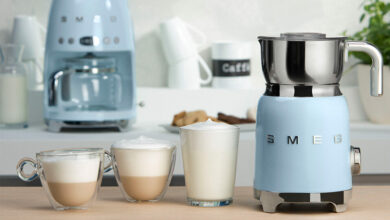Coffee Scale vs Kitchen Scale: Features & Convenience Evaluated
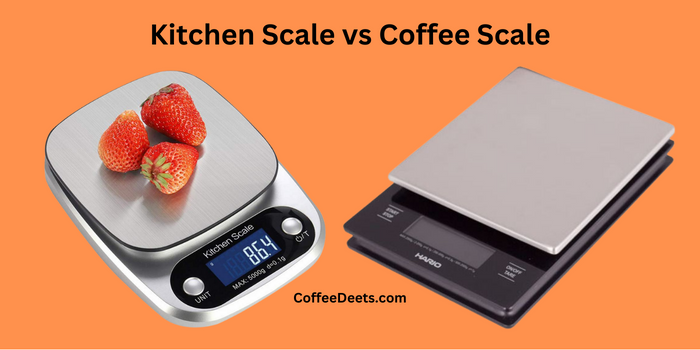
It’s no secret that having a scale in the kitchen is essential for precise measurements. You can measure out portions, swirl in spices, and get the precise amount of cake batter needed to make a perfectly fluffy cake. But if you’re a coffee lover, you may be wondering which type of scale is best to measure the precise amounts of coffee you need. Is it a coffee scale or a kitchen scale? Well, the answer, like most things in life, isn’t so simple. Let;s dive in the battle of coffee scale vs kitchen scale.
In this article, we’ll explore the pros and cons of both scales to help you decide which one is best for you. We’ll also look at features like precision, accuracy, maintenance, and pricing so you can make an informed decision before making a purchase. So grab a cup of Joe and hang on tight because we’re about to dive into understanding the coffee scale vs kitchen scale debate.
Evaluating Kitchen Scale
The kitchen scale is a common household weighing tool used for measuring ingredients and food portions. Its design makes it ideal for small, precise measurements, as it measures up to one-tenth of a gram. Its portability and reasonable price make it an attractive option for amateur bakers and cooks.
The main advantage of using a kitchen scale over a coffee scale is its higher resolution, which allows for more accuracy when measuring smaller amounts. Additionally, because most kitchen scales are battery-powered, they do not require an external power source, making them less prone to interference from electric signals. Furthermore, unlike many coffee scales, kitchen scales are designed to be more user-friendly, a handy feature for first-time bakers who may not be familiar with all the nuances of coffee weighing.
Kitchen scales often have relatively short lifespans due to their minimal construction and sensitivity to temperature changes, so they may need replacing after a few years of use.
In conclusion, while kitchen scales have great potential to improve accuracy when measuring smaller items, such as baking ingredients and food portions, they are limited when it comes to performing any task which requires larger weights or special measurement units.
Next, we’ll explore if this tradeoff results in decreased accuracy when compared to other coffee scales, and the best uses for each type of scale. So, let’s examine the measurement accuracy between a coffee scale vs a kitchen scale.
Measurement Accuracy
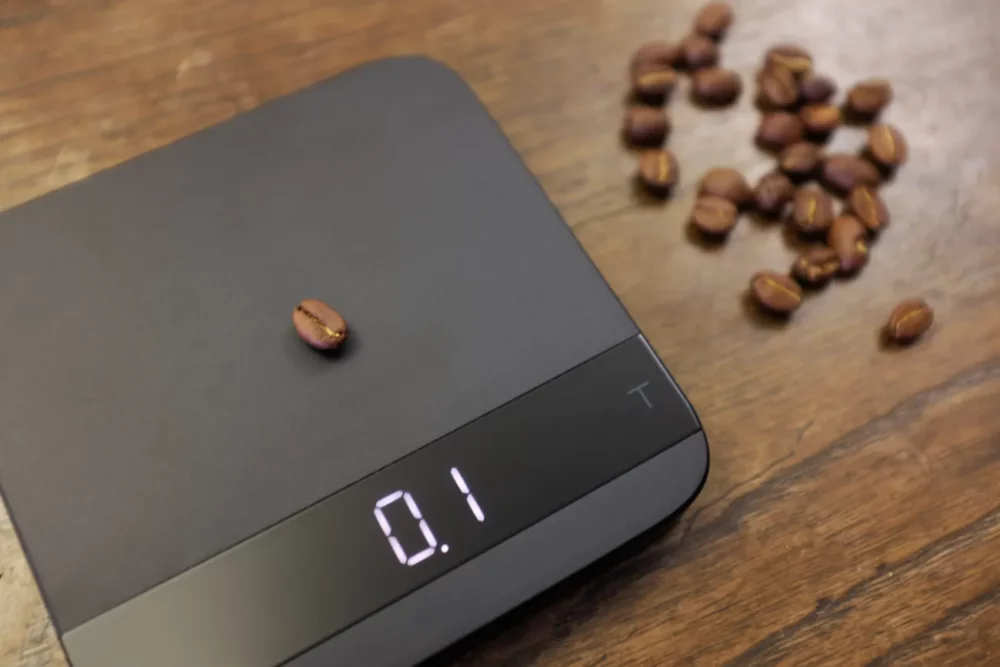
When measuring ingredients, the accuracy of your results will have a major impact on both the flavor and texture of the final product. This is why it is essential to choose a scale with accurate measurements no matter which one you decide to use.
A kitchen scale typically uses grams, pounds or ounces, as its measurement units, while a coffee scale may also utilize other units such as milligrams (mg) or litres (l). If you’re using a kitchen scale for measuring beans, for example, you won’t be able to get measurements as precise as if you were using a coffee scale.
Some kitchen scales are equipped with built-in increments of 0.1g, but many do not have that level of accuracy and may round up/down measurements in tenths of a gram. On the flip side, some precision coffee scales can measure up to 0.01g, making them much more adept at weighing out small amounts of coffee beans and brewing recipe ingredients.
Now let’s move on to examining the features available between digital kitchen scales vs coffee scales in our next section.
Features: Kitchen Scale vs Coffee Scale
When considering which type of scale to use for your kitchen and coffee needs, it is important to first look at the different features that each type of scale offers:
A coffee scale will have several key features designed specifically to help you measure coffee beans and grinds accurately. It will usually have a tare capability, allowing you to zero out the coffee weight first before measuring other ingredients. Additionally, it will give readings in very precise increments (e.g., tenths or hundredths of a gram), making sure that even small changes in ground coffee bean amount affect the cup’s taste. Furthermore, some models offer various brewing modes, helping users dose their coffee in the desired way (e.g., by time or weight). If you brew espresso, a coffee scale would be best in order to be able to fit the scale on your drip tray as you pull the espresso shot. Coffee scales are very accurate and easy to use. It can be used by both home cooks and professional bakers, and are especially ideal for coffee makers, who love to make and have coffee every now and then.
Kitchen scales are not as specialized as their coffee counterparts; however, they can be used for multiple purposes in the kitchen including measuring dishes for baking, weighing food ingredients, and meal portion control. A Food scale is the most used Digital kitchen scale among home cooks as well as professional cooks. Kitchen and food scales often come with more traditional features like digital displays with large readouts and removable trays for easier cleaning. Some models may also have memory functions that can store up to eight measurements at once and often many kitchen scales include more common attachments such as cups or spoons for easy filling.
Whether you choose a coffee scale or a kitchen scale, it should be noted that neither of these scales is a ‘one-size-fits-all’ solution, so if your needs are more specialized, then you may need both types of scales depending on what you require for better usage and satisfaction in the kitchen.
Now that we’ve considered the features of both types of scales let’s take a closer look at their cost in the following section.
Evaluating the Cost
When trying to decide between a coffee scale and a kitchen scale, it is important to consider the cost. Kitchen scales tend to be lower in price, with most models selling for less than $25 for professional-grade models. On the other hand, Coffee scales typically range from around $25 up to over $200 for high-end models due to their specialized design. While this might seem like a large difference, it is important to remember that while a kitchen scale can be used as a basic tool for measuring, the best coffee scales often come with more advanced features such as LCD displays, time-tracking timers, and multiple weighing modes. Depending on your needs, the added features and accuracy of a coffee scale might make it worth the extra initial investment. But, the question over here, ‘is coffee scale worth’ depends upon your usage.
In the end, it depends on how much you plan on using the scale. If you’re an occasional coffee drinker or baker looking for occasional measurements, then stick with a kitchen scale; however, if you’re serious about consistently making high-quality coffee drinks and want an accurate measurement every time, then you should invest an extra bit of money into a good coffee scale.
Coffee scales tend to require less upkeep than kitchen scales, which makes them more cost-effective over time. For example, if you are using a coffee scale for measuring out small quantities of coffee grounds or tea leaves, then you won’t need to replace them nearly as often as you would with a kitchen scale. On the other hand, if you need precision measurements on heavier items like flour or sugar, then investing in a higher-end kitchen scale may be more cost-effective in the long run.
Next in coffee scale vs kitchen scale, we will discuss some of the key benefits that coffee scales offer over regular kitchen scales.
The Benefits of Coffee Scales
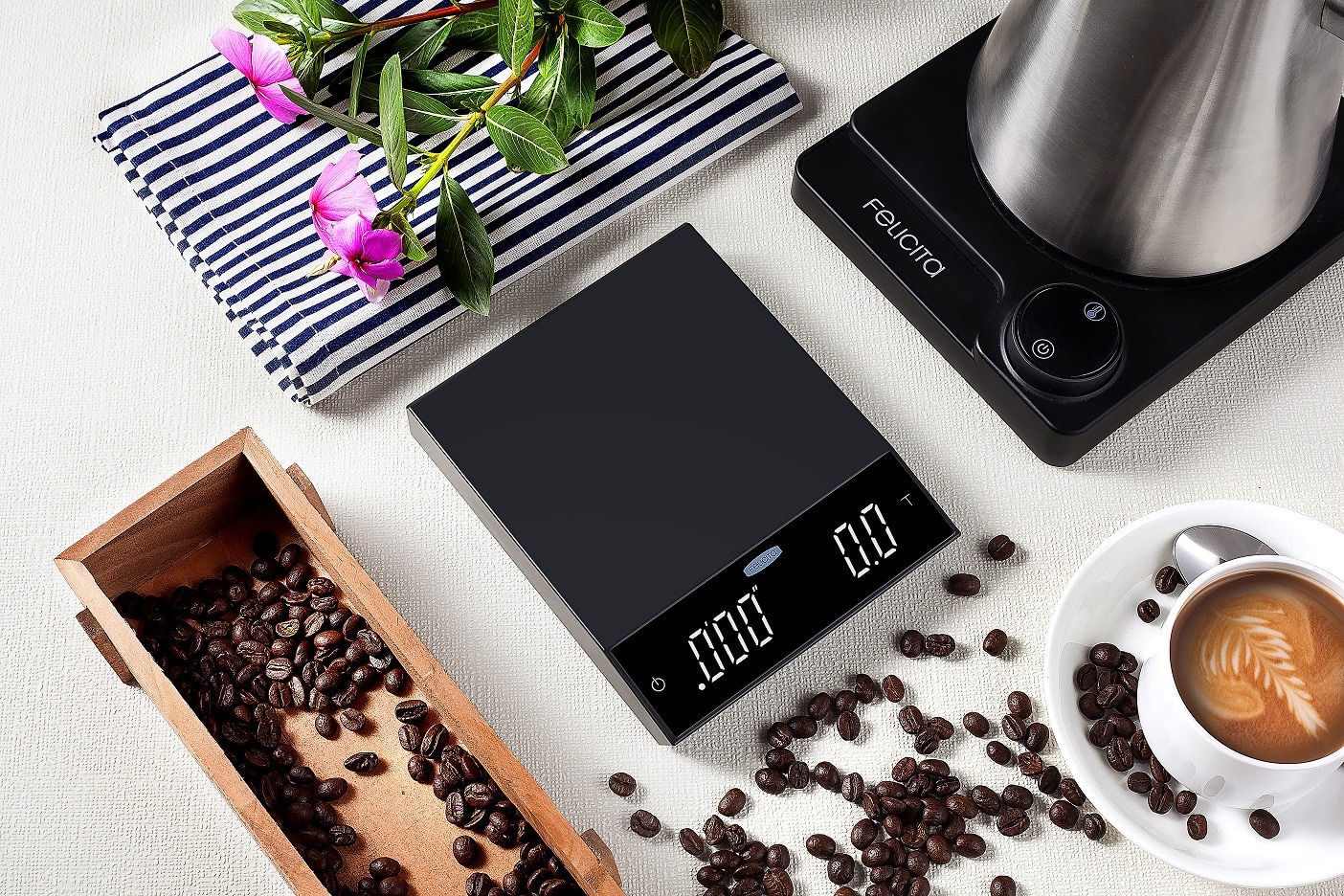
When considering buying a scale for coffee, it’s important to understand the benefits that a coffee scale offers over a traditional kitchen scale.
The main benefit of using a coffee scale is accuracy. Coffee scales usually come with a margin of error of 0.1g, while kitchen scales tend to have much higher margins of error, as high as 1g. With this accuracy, home baristas can start to dial in recipes more accurately and continuously refine them until desired results are achieved.
Coffee scales also read the weight in real time. Because the weight display on the best coffee scale isn’t lagging behind with the actual measurement, you can watch the exact increments as you add more grams from your dosing container, allowing for better control when adding ingredients and ensuring an exact amount is added each time rather than over or under-filling. Many also come with built-in timers which make it easier to track how long water is being poured on top of the grounds while brewing or making espresso.
Many coffee scale models like Acaia are able to handle higher maximum capacities than standard kitchen scales, some up to 3kg or 6lbs, which is helpful when using larger batches of coffee. There are even water-resistant versions available that are ideal for anyone who will be using their scale outdoors or in wet conditions.
Coffee scales do come at a premium though, so if you’re just interested in dabbling with home espresso and won’t be needing features like zero tracking or multiple units of measure, then you may want to start out with a regular kitchen scale instead of espresso machine.
So, for anyone looking for increased accuracy and control when making specialty coffees like pour-over and espresso, there’s much to gain from investing in a quality coffee scale.
So, if you are a coffee lover and always up for a perfect cup of coffee, having a coffee grinder won’t serve the purpose. You ought to have a coffee scale in place.
Next in this coffee blog, we’ll explore how precision weighing with a coffee scale helps ensure even extraction every time.
Precision Weighing
Precision weighing is an important factor to consider when choosing between a kitchen scale and a coffee scale. Kitchen scales are minimally equipped with an accuracy of 1g, which may be suitable for measuring ingredients for baking or food preparation as small as quarter teaspoon measurements. On the other hand, most coffee scales are more precise with their measurements, typically coming with up to 0.1g accuracy, depending upon the specific model you choose.
Both types of scales also have features that allow users to get very precise readings. If you are serious about your coffee making and need to make sure you’re using the right amount of coffee grounds for each cup, then having a high precision reading on a coffee scale is invaluable. Coffee scales usually have a tare function which eliminates the weight of any container you’re using so that only the weight of the coffee beans, grounds, or extract is shown. Kitchen scales don’t all come equipped with this same precision feature; however, some models do feature it, allowing them to compete in the same manner as coffee scales in terms of accuracy when measuring smaller amounts of ingredients.
It’s evident there can be great benefits from both coffee and kitchen scales through precision weighing capabilities, depending upon what type of measurement is needed.
Now let’s move on to look at the convenience factors in coffee scale vs kitchen scale.
Coffee Scale vs Kitchen Scale – Convenience
In terms of convenience, coffee scales undoubtedly have a major advantage over kitchen scales. Coffee scales are designed to be as unobtrusive and easy to use in a coffee preparation environment as possible. They typically feature backlit displays that make it effortless to weigh ingredients, even when the room is dark — no one likes having to fumble around for a light switch before making their morning latte.
Furthermore, many coffee scales are compact and lightweight, making them easy to store and transport if necessary. Depending on the model, certain features, such as auto shut-off times and taring capabilities may also enhance user experience significantly by allowing baristas to quickly switch between tasks without worrying about resetting the scale.
While kitchen scales have limited application in the coffee preparation process, they have some advantages that make them more convenient than coffee scales in other contexts. For instance, kitchen scales often offer greater precision and accuracy levels than their coffee-focused counterparts due to their heavier weight limit capacities, something that could be seen as an advantage for those measuring items such as herbs or small amounts of flour with greater accuracy. Additionally, kitchen scales often have larger platform surfaces which makes them perfectly adept at accommodating large containers for easier bulk-weighing operations.
Despite their slight differences in convenience depending on usage context, both coffee and kitchen scales provide essential tools for accurate measurement of content weight within the home or commercial kitchen setting. While a dedicated coffee scale may be the ideal tool for creating your favorite espresso drinks, it helps to consider all factors if you find yourself needing an all-in-one solution. To compare capacity levels between these two types of scales more closely, let’s take a look at their key specs in greater detail.
Comparing Capacity Levels
When it comes to making drinks, weight is a critical factor in perfecting the flavor and ensuring consistency. But what are the differences between coffee scales vs kitchen scales when it comes to capacity?
For coffee enthusiasts and baristas, coffee scales have a clear advantage. Most kitchen scales have weight capacities of between 2-7kg, while a good-quality coffee scale will usually range up to several thousand grams! That extra capacity gives you more control when measuring out espresso shots and other delicately weighed ingredients like cocoa powders or syrups. Some even come with dedicated pour over coffee go-over modes and drip timers, so you can get your grinds just right.
On the other hand, kitchen scales may have a few extra features that some coffee lovers may find useful—such as assigning a nutritional value to individual ingredients or tracking entire meals. Plus, kitchen scales are generally cheaper than their more specialized kin, so if you’re just getting started with home brewing, this may be the better option for budget reasons.
In the end, most serious home baristas will likely benefit from investing in a digital coffee scale with higher levels of accuracy and precision. But for casual coffee drinkers looking for a bit more convenience in their measurement routine, a basic kitchen scale should do just fine.
No matter which side you land on, one thing is clear: both types of scales can help keep your measurements accurate and consistent for better-tasting beverages. And with that in mind, let’s take a closer look at the robustness and versatility of these tools.
Robustness and Versatility
Robustness and versatility are key considerations when deciding between a coffee scale and a kitchen scale. Coffee scales tend to be more robust, built with industrial materials like stainless steel and aluminum that are able to handle heavy coffee equipment. Coffee scales can also take into account other variables like water temperature, as well as standard measurements like grams and ounces. They typically also have built-in calculators that allow baristas to measure out precise volumes of liquid or concentrate when making espresso drinks.
On the other hand, kitchen scales may be more appealing for those who use them for multiple purposes rather than just brewing coffee. Kitchen scales can measure items of varying sizes and shapes, allowing them to accommodate everything from food items to larger box deliveries.
Overall, both types of scales have their own strengths and weaknesses, so understanding what you plan on using the scale for is essential in determining which one is best for you.
Next, we’ll compare the performance of coffee scales and kitchen scales.
Comparing Performance
When it comes to performance, a kitchen scale and a coffee scale offer two very different functions. Kitchen scales measure mass, making them ideal for cooking and baking recipes that require accurate measurements of ingredients. In addition to soft ingredients like sugar and flour, kitchen scales can also handle wet ingredients and heavier items like whole fruits and vegetables.
A coffee scale performs differently from a kitchen scale in that it measures two things: mass and time. This is essential for weighing coffee and for brewing coffee because timing the brewing process is essential to get a great cup of coffee every time. Coffee scales are extremely precise and are able to measure weight with an accuracy that few kitchen scales can match.
Overall, a kitchen scale is necessary when you need to accurately measure the quantity of ingredients in recipes that require precise measurements. On the other hand, coffee scales are crucial for precisely measuring coffee grounds and timing the brewing process correctly.
Evaluating the cost of coffee scale vs kitchen scale is the next step toward determining which one makes the most sense for your needs.
Kitchen scales tend to be more versatile and than other scales designed for heavy-duty use.
Final Thoughts on Coffee Scales vs Kitchen Scales
It really comes down to personal preference and the type of tasks you will be completing while evaluating Coffee Scale vs Kitchen Scale. Coffee scales are specifically designed to brew coffee, meaning they measure accurately down to 0.1g making them ideal for precision-based coffee recipes. Kitchen scales, on the other hand, may not offer as much accuracy, but they can measure a wider range of items.
Coffee scales are often seen as more expensive than kitchen scales due to their precision and reliability. However, is a reliable scale no matter what type of coffee maker you own,
However, if you need versatility and don’t have very specific recipes that require exact measurements, then a kitchen scale would work just as well. Kitchen scales also tend to be less expensive than coffee scales and generally include features such as taring abilities, strength indicators, and measuring cups (which may be handy for extra accuracy).
Ultimately both coffee scales and kitchen scales have benefits in different situations so it is important to determine which one is best suited for your needs before investing in either one.
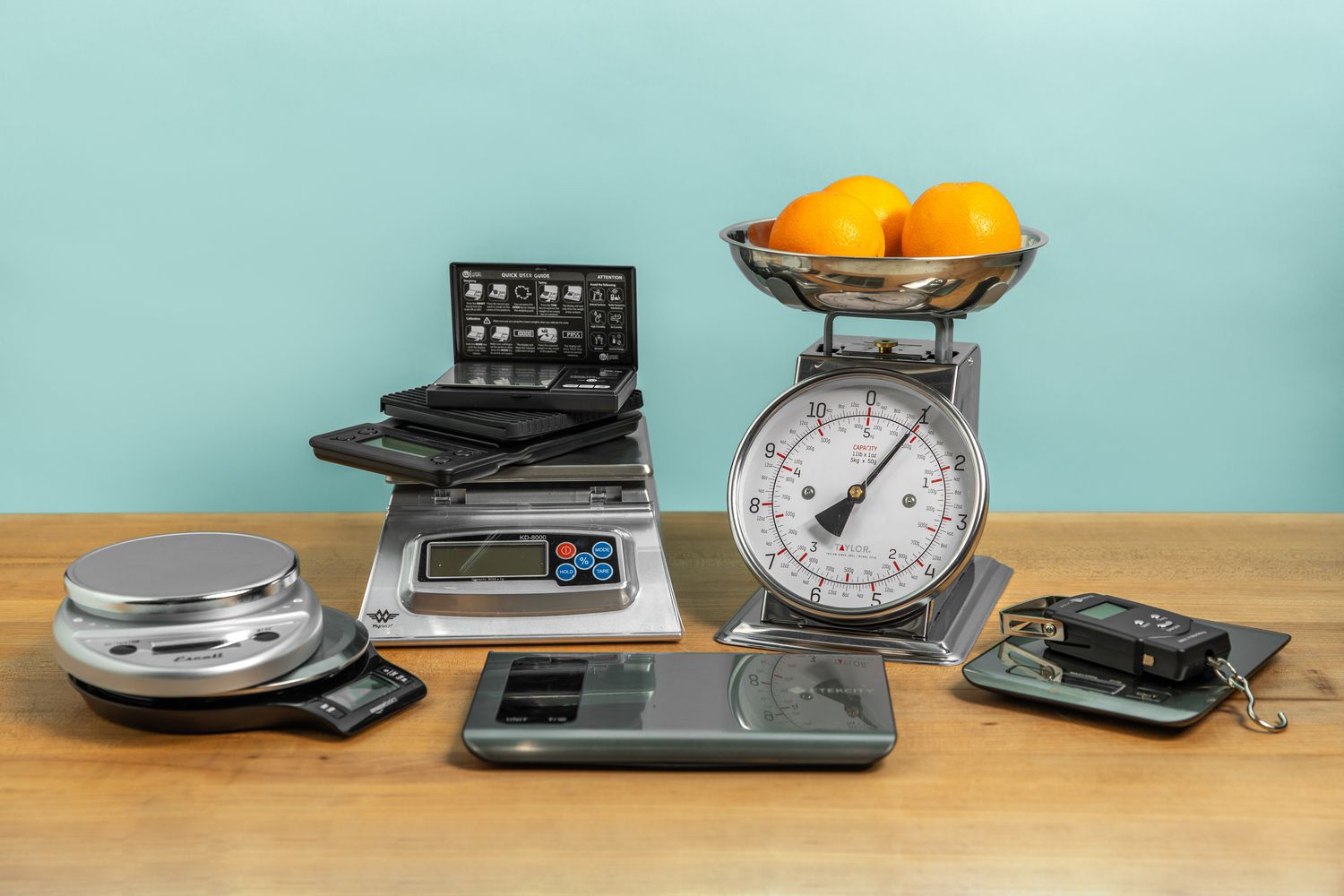
Frequently Asked Questions with Explanations
Are coffee scales more accurate than kitchen scales?
Yes, coffee scales are more accurate than kitchen scales. Coffee scales are specifically designed to measure the exact amount of beans and grounds needed for brewing. They should be used within a few grams of accuracy to brew the perfect cup of coffee. Kitchen scales, on the other hand, generally measure in ounces or pounds and are less precise than coffee scales – often only measuring up to one decimal point at best.
In addition, kitchen scales sometimes don’t provide the level of accuracy that coffee scales can provide, which can make it difficult to determine how much grinding is needed when trying to achieve an even extraction rate.
What features does a coffee scale offer that a kitchen scale does not?
If you evaluate coffee scale vs kitchen scale, you’ll find that a coffee scale offers several features that a kitchen scale does not. For starters, coffee scales typically boast increased precision in measurements, allowing for more accurate readings than typical kitchen scales.
Additionally, coffee scales often feature built-in time readings, making them perfect for pour-over style brewing methods which require precise levels of water poured in specific intervals of time.
Finally, coffee scales also have tare functionality, which allows users to deduct the weight of any container before measuring their ingredients. This is helpful when brewing multiple cups of coffee, such as with Aeropress or French Press, since it allows you to calculate exactly how much coffee is used per cup without needing to re-zero the scale every time.
What are the advantages and disadvantages of using a coffee scale compared to a kitchen scale?
The main advantage of using a coffee scale is the fact that it is far more accurate than a kitchen scale. A coffee scale can measure down to a tenth of a gram or less, while kitchen scales generally measure down to only one gram accuracy at best. This is important for getting exact measurements for coffee brewing, which in turn helps you to make sure that the grind size and amount of ground coffee beans used correlate with the correct amount of water for the perfect cup of coffee.
Another advantage of a coffee scale is that it usually has built-in timer functionality, allowing you to set a specific time limit for each portion of your brewing process. This can help give you consistent results every time and make sure that your extraction is never too long or short.
The main disadvantage of using a coffee scale is that they generally cost more than kitchen scales and often come with extra features such as timers that you may or may not need. Furthermore, coffee scales tend to have smaller surfaces than kitchen scales.
In conclusion, although there are some advantages and disadvantages associated with using either type of scale, it ultimately comes down to personal preference and how much accuracy you need in measuring out ingredients for coffee brewing. If you’re looking for maximum accuracy then definitely go with a coffee scale, but if you don’t need this level of precision, then a kitchen scale could be your best option.
